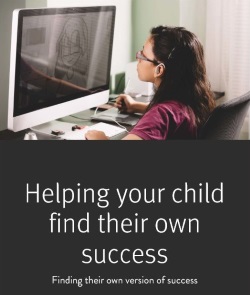Having a young person going through secondary school is certainly a challenging but rewarding experience for parents and carers. Often we are asked "How can I help my child?" Parents and carers cannot be expected to be able to help with every subject a student studies, but there are many things which can be done to make secondary school years successful for young people.
The most important things I recommend for parents are:
- Love your child and listen to them – open, regular meaningful communication breaks down barriers and helps you understand this developing young person
- Support your child but help them to become resilient by suggesting strategies to solve problems, rather than solve them for the child
- Make sure they eat and sleep well
- Monitor their internet and smartphone usage (take the phone off them at night even)
- Keep them actively involved in healthy extra curricular activities like sport
- Check that they are doing homework and keeping up to date with assessment. Make sure they have a good place to study
- Don't be afraid to say "no" when it is clearly in the child's best interests
- Support the school – we are all here to help your child succeed
- For Junior students, get them to read to you often, and even read to them
Actioning Change Together (ACT) – Whole School Wellbeing Program
As part of our commitment to looking after the health and wellbeing of our students, a new initiative for 2023 has been the introduction of our school-wide wellbeing program. “Actioning Change Together" (ACT) will be taught in one lesson per week (Years 7 to 10) or two lessons per week (Years 11 and 12). The purpose of ACT is to proactively teach all students to work together in a collaborative, safe and respectful space. Students will learn how they can take actions to better themselves individually, as well as collectively, and to actively promote positive social change.
Please see the attached ACT Parent Information Letter in our Useful Links section, as well as Fact Sheets about the Respectful Relationships Education Program that will be covered during ACT. Further information on the Respect program can also be found at https://education.qld.gov.au/curriculum/stages-of-schooling/respectful-relationships
Supporting your child's education - Spark their future
The Queensland Government has developed this amazing website with  information for parents on how they can support their child's education.
information for parents on how they can support their child's education.
Please visit this site for information on such things as:
How family rituals can help teens connect at home and at school
How thinking about thinking can help your child learn better and live better
Dealing with your child's spark when it's not the same as yours
How to help your child transition to life after school
Five ways you can support your child's education
Sparking resilience
What to do if you think your child is displaying bullying behaviours
What to do if you think your child is being bullied
The website is: https://www.sparktheirfuture.qld.edu.au/
The Department of Education also has some excellent support resources for parents and carers.
The University of New South Wales has an excellent set of resources for parents and caregivers. I encourage you to look at these by clicking on the Uni's image below:

I encourage parents to keep open lines of communication with our school. Often the truth gets clouded by emotion and the 'teenage brain', so it is very important to keep things in perspective and discuss concerns with the school. If there is a problem, we will do our very best to solve it.
Kyrra Mickelborough
Principal